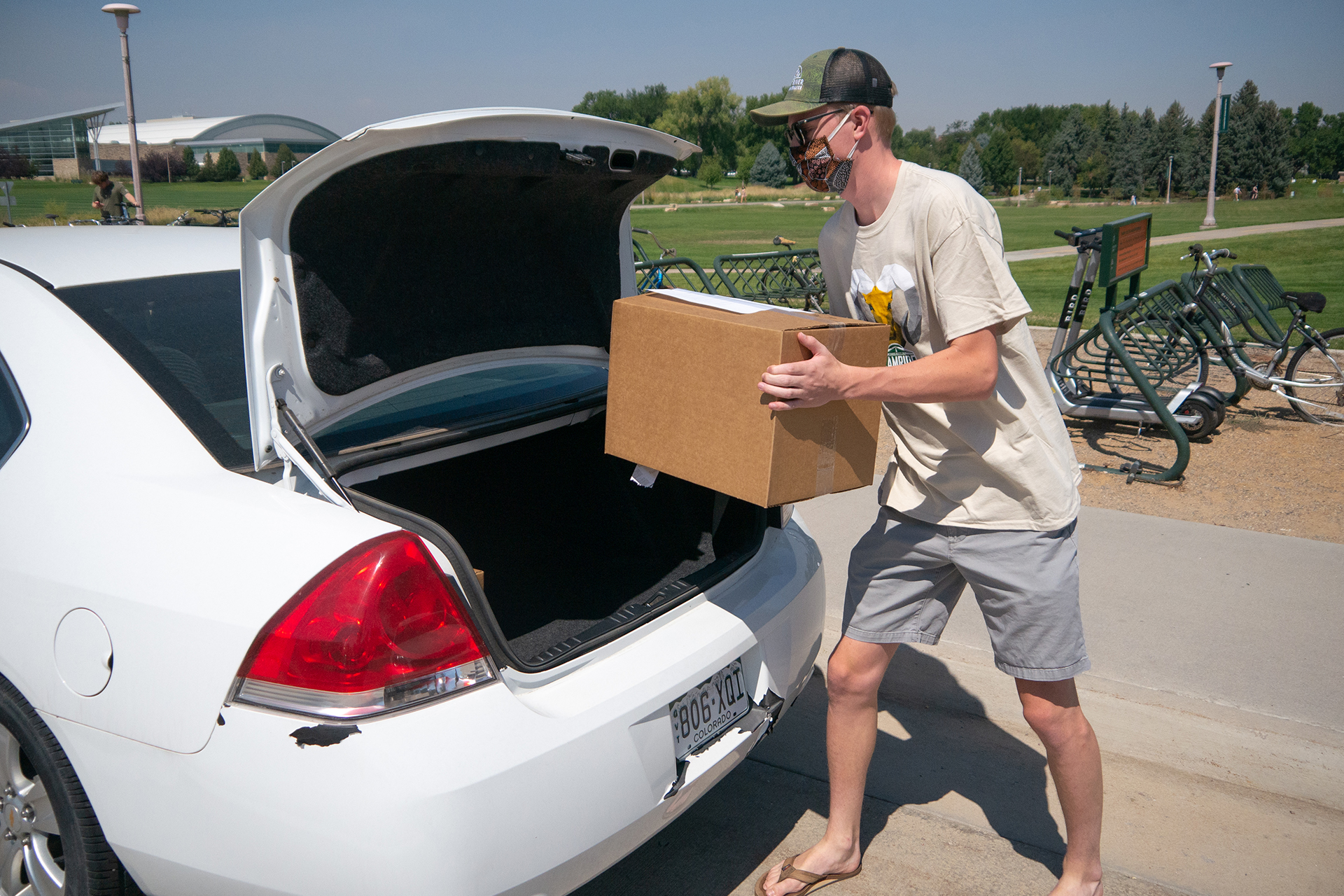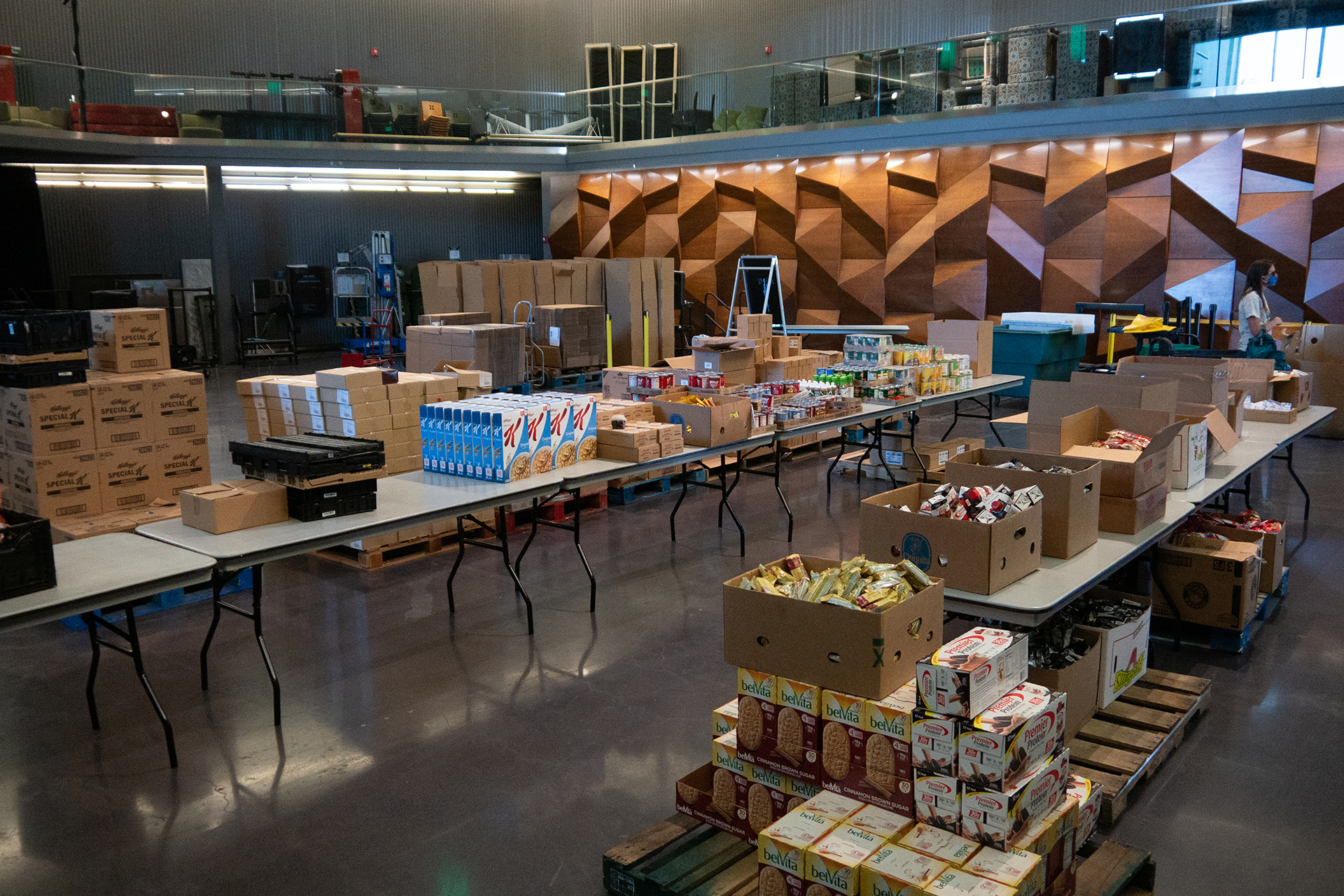Virtual Innovation
Division of Student Affairs addresses digital equity during pandemic through collaboration story by Joe Giordano published April 28, 2021Photo by Joe Mendoza/CSU Photography

From the earliest days of the onset of COVID-19, leadership from Colorado State University’s Division of Student Affairs quickly realized the adverse impact the pandemic would have on educational equity.
Student access to academic resources and support, as well as employment and food, were at stake as classes and university services moved to a virtual environment.
“We were very aware that there were access and technology gaps for some of our students, particularly our first-generation, low-income and underrepresented students,” said Vice President for Student Affairs Blanche Hughes. “Providing resources to ensure that all students could successfully transition to online learning and access virtual services was a top priority.”
Student Affairs embraced the challenge, collaborating across campus to proactively prioritize the University’s most vulnerable students and using COVID-19 as an opportunity to innovate in the spirit of educational equity to help all students. Because of this, CSU developed creative and trailblazing solutions in the face of the pandemic.

“Providing resources to ensure that all students could successfully transition to online learning and access virtual services was a top priority.”
— Blanche Hughes, Vice President for Student Affairs
Websites to assist students and faculty in virtual environments, a text message hub for students to receive important reminders, and a partnership with rideshare company Lyft to address transportation security issues were just a few of the collaborative initiatives developed during the pandemic.
At the heart of these innovations was a commitment to social justice and equity — a cornerstone of CSU’s land-grant mission, according to Hughes.
“Our virtual innovations uphold the principles of access and excellence, contextualized by our university’s Principles of Community — a North Star for our short- and long-term decision making, planning and resource allocation,” she said.
Collaboration


RamRide Food Ops has been one of several initiatives born out of the pandemic that has helped the university community.
When Jody Donovan, assistant vice president for student affairs and dean of students, reflects on the past year, she thinks about the collaboration across campus.
Whether it was the CSU Bookstore working with CSU Libraries to provide digital access to textbooks or RamRide working with Rams Against Hunger to address food insecurity, Donovan said the sharing of expertise was essential.
“I hope folks can feel really proud of what this University has done to serve our students during this pandemic,” she said.
Donovan cited the RamRide program as one of the many ways Student Affairs offices stepped up during the pandemic. Founded in 2003 by the Associated Students of CSU, the program now within Off-Campus Life provides safe rides for students throughout the academic year.

“I hope folks can feel really proud of what this University has done to serve our students during this pandemic.”
— Jody Donovan, Assistant Vice President for Student Affairs and Dean of Students
When the pandemic hit, RamRide pivoted, partnering with Lyft to temporarily offer a flexible, cost-effective and sustainable transportation alternative for the campus community. The RamRide x Lyft program gives students access to discounted rides for potential transportation home from school or work or to the grocery store, for example, nationwide. The service has provided more than 11,320 rides as of March 2021.
“This new RamRide x Lyft program allows us to expand our hours of service, our areas of service, and support our students all over the U.S. during this pandemic,” said Lindsay Mason, director of Off-Campus Life.
But it didn’t stop there.
RamRide also expanded to support students’ basic needs through RamRide Food Ops, a food delivery program with Rams Against Hunger and the Food Bank for Larimer County that delivers boxes of free food from the Rams Against Hunger Food Pantry to on- and off-campus students, faculty and staff.
Bri Colon, program coordinator in Off-Campus Life, explained that RamRide Food Ops started as a student idea to further address food insecurity on campus. For a few months before the pandemic, the service provided weekly rides from CSU’s Mobile Food Pantry and to the Larimer County food bank when the food pantry was not open.
At the start of the pandemic, “we altered our model to a food delivery service,” Colon said. “This allowed us to transport free food to people in vulnerable populations who can’t travel to campus.”
As of March 2021, Colon said RamRide Food Ops has delivered 16,980 pounds of food to 602 CSU community members.
Leadership
Ryan Barone, assistant vice president for student success, cited leadership as a key to the spirit of innovation at CSU, adding that the University is not afraid to experiment and learn from experience.
“There’s a really authentic commitment to thinking outside of our institution as we’re trying to think of solutions to respond to problems,” Barone said.

“There’s a really authentic commitment to thinking outside of our institution as we’re trying to think of solutions to respond to problems.”
— Ryan Barone, Assistant Vice President for Student Success
Student Affairs, through cross-campus collaboration, has developed more than a dozen virtual initiatives since the start of the pandemic to help students, prioritizing essential needs such as food, shelter, technology and transportation.
Donovan explained that their efforts significantly helped students from underrepresented populations. Approximately 25% of undergraduate students at CSU are first generation, 22% are Pell-eligible, and 27% are racially minoritized, according to Institutional Research, Planning, and Effectiveness data.
“These students have been disproportionately impacted by COVID-19,” Donovan said. “So we did things to help ensure their needs were being met, while also addressing larger systemic issues at the University.”
Virtual innovations across the university
Keep Learning, Keep Teaching, and Keep Engaging websites: With more than 100,000 views to date, these three websites were designed to help students and faculty adapt to a virtual environment.
New Technology Support: Chat widgets were added to Student Affairs websites to connect students with staff in real time. A text messaging hub was created for students to receive text reminders for upcoming virtual appointments with Microsoft Teams links so students could join on their smartphone. With more than 50,000 messages sent, texting proved to be the most effective tool for reminding students in campus housing about COVID-19 testing.
Navigate: The student success management platform Navigate has intentionally grown beyond just academic advisors and is now used by the Career Center and TRiO Student Support Services programs to better engage students.
Virtually Delivered Financial Aid Support: PULSE surveys identified students who needed resources to secure adequate technology for success in virtual instruction. Over 600 students were identified, and 55-plus faculty/staff called every student, helping them access emergency aid to secure technology, and addressed concerns. The 200-plus undocumented students who didn’t qualify for the CARES Act funding were each awarded $1,500 in institutional aid.
Academic Material: CSU Libraries immediately digitized more than 67% of course reserves, increase e-book purchases by more than 700%, increased streaming media by more than 1,000% and subscribed to a new video collection to support remote instruction with 68,000 online academic videos. Extra laptops were added to the checkout fleet, 180-plus laptops were shipped for free to students, and 23 computers in their lab were made available via remote login.
Ramz Kids Virtual: Ram Kidz Village provided supervised educational activities for children ages 1-11 in Morgan Library. Student parents can now pick up age-appropriate activity bags, featuring craft instructions and storytime to accompany the books in the bags. RamRide has also recently partnered with Ramz Kids to deliver these activities to student parents off-campus who cannot travel to campus.
RamRide x Lyft: One of the largest safe-ride programs in the U.S., RamRide, partnered with Lyft to use its technology infrastructure during the pandemic. RamRide x Lyft offers university-subsidized rides through the Lyft app throughout the U.S. so students can access reliable transportation.
RamRide Food Ops: RamRide partners with the Food Bank for Larimer County and Rams Against Hunger to address food insecurity for the CSU community, delivering boxes of free food from the Rams Against Hunger food pantry.
Student Employment: Student employees are a vulnerable group, with nearly 22% relying on need-based work study. Through constant advocacy from Student Affairs and the Career Center’s Student Employment Services, 3,866 students will receive pay through the end of the Spring 2020 semester. This was a gross total of $3.25 million in wages.
Support for Students Living on Campus: Each residential community has its own Microsoft Teams group as a space for building community, hosting programs and allowing residents to interact with community staff. With public health limits on in-person social interactions, Teams has allowed administrators and student staff to have accessible conversations and share valuable outreach within University Housing.
SDPS Virtual Engagement: The Black/African American Cultural Center has emerged as another exemplar for virtual community building. B/AACC uses Instagram Live for B/AACC Chronicles to promote and amplify the lived moments and experiences of Black students and staff. They also host other virtual sessions to evoke positivity and motivation for the Black community. The other six SDPS offices also offer similar virtual engagement with students in culturally responsive ways, while the Fostering Success program for former foster youth continues to meet virtually for support and community.
Teamwork
Throughout the pandemic, Student Affairs leaders played key roles in implementing essential virtual programs and services.
In many cases, structures were changed, positions were adapted, and new committees were formed.
Two directors from Student Affairs, in the CSU Health Network and Adult Learners and Veterans Services, were tapped to co-lead the University’s Pandemic Preparedness Team based on their previous military service. The Vice President for Student Affairs was tasked with co-leading the Student Life Recovery and Continuity team, and the Dean of Students was tasked with co-leading the Social Norming Task Force and serves on the Teaching Recovery and Continuity Team.
“The foundation of Student Affairs is to look at the holistic well-being of a student, so it drives us to collaborate with our partners who are engaged with students in their expertise,” Donovan said. “Student Affairs plays a huge role in [student] retention and success, and so we necessarily need to be involved across the university.”
With glimmers that the pandemic’s end may be in sight, Student Affairs is planning what’s next.
Donovan said leadership has learned a lot and gained valuable new insights that will help as the University moves into the Fall Semester.
“You won’t catch many Student Affairs people saying they want to return to what was,” she said. “That ‘normal’ wasn’t necessarily good for all of our students. We want to take what we’ve learned and do a better job of meeting our students’ needs.”
Partners in Student Success
Partners in Student Success is a special collaboration between the Division of Student Affairs and SOURCE that highlights the impact of collaboration across the University in helping students succeed. Experience more at source.colostate.edu/partners-in-student-success.